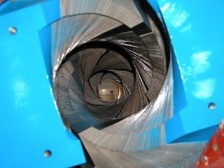Opportunities for Polarized Physics at Fermilab




Sponsored by Fermilab Research Associates and the Portland Physics Institute
In 2012, polarized Drell-Yan experiment Fermilab E-1027 was given Stage-1 approval. In addition last year, an Expression of Interest in measuring the electric dipole moment of the proton using polarized protons at Fermilab was submitted by the Storage Ring EDM Collaboration. The workshop aims at bringing together the communities studying nucleon structure, QCD, and EDMs in order to explore common interests and needs, and potentially broaden the physics program that could be achieved with polarized proton beams at Fermilab. Technical aspects of realizing polarized beams will also be discussed.
The workshop will begin at 9am on Monday and end at 5pm on Wednesday. There will be a reception held on Tuesday evening.
The workshop agenda can be found here.
The list of participants can be found here.
Organizing Committee:
-
Christine Aidala (Chair) – University of Michigan
-
Dennis Sivers (Co-Chair) – Portland Physics Institute
-
Mauro Anselmino – University of Torino and INFN Torino
-
Alan Krisch – University of Michigan
-
Maria Leonova – Fermilab
-
Ming Liu – Los Alamos National Laboratory
-
Paul Reimer – Argonne National Laboratory
-
Yannis Semertzidis – Brookhaven National Laboratory
A limited number of contributed talks will be accommodated.
Inquiries about contributions and other questions should be directed to the organizers at PolarizedProtonsOrg@fnal.gov
Links for Fermilab visitors:
-
•Directions to Fermilab (Google Maps)
-
•Fermilab site information and request form for on-site housing
Images used courtesy of Masahiro Okamura (see the linked article here) and Fermilab Visual Media Services and are the property of their respective owners.

May 20-22, 2013, Fermilab
“If we are to resolve the puzzle of [proton] spin in general and quark orbital angular momentum in particular, it is vital to make a direct measurement of the Sivers distribution for antiquarks. The only process with which this can be cleanly accomplished is Drell-Yan, with its innate sensitivity to antiquarks.” E-1027
“If there is new physics at the LHC scale, the experiment will be able to probe CP-violating phases down to 0.1 μrad, making it the most sensitive probe for CP-violation beyond the standard model. Finding a non--zero EDM value will point to a new, strong CP-violating source, which is needed to solve the mystery of the baryon-‐antibaryon asymmetry of our universe.” Storage Ring EDM Collaboration



